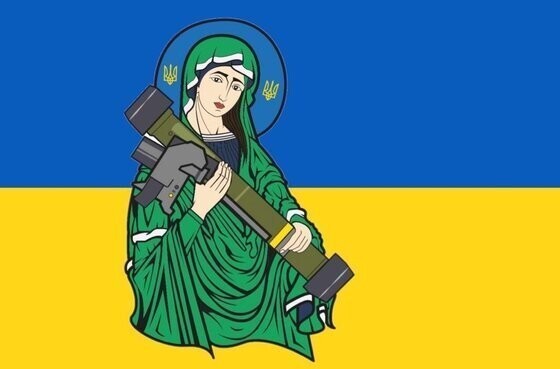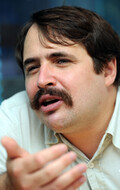hankyoreh
Links to other country sites 다른 나라 사이트 링크
[Column] The power to end Putin’s war lies in the Ukrainian people fighting back

The international community is outraged over the massive destruction and civilian casualties in Ukraine resulting from Russia’s invasion. Russian-born Pak No-ja, who also goes by Vladimir Tikhonov, a historian and philosopher and a professor at the University of Oslo, Norway, has sent in an urgent column in which he unpacks the challenges that will befall the countries of the former Soviet Union because of the Putin regime’s misjudgment.

Let me begin with a famous incident in modern Korean history.
When the citizens of Busan and Masan rose up on Oct. 16, 1979 — fed up with rampant inflation from the second oil crisis, the structural poverty produced by rapid growth that relied on low wages, and the tyranny of Park Chung-hee’s Yushin regime — Park tried to suppress the uprising violently with military force. During a discussion with his subordinates, he even declared he would send in the troops and have them open fire.
Cha Ji-cheol, head of the presidential security service and an ultra-hardliner, made remarks that were nearly unbelievable in their brutality. Noting that the world hadn’t blinked an eye when 3 million people were slaughtered in Cambodia, he mused that Korea could get away with killing 1-2 million demonstrators.
In effect, the dictator and his cronies had already lost their grip on reality and were essentially gearing up to commit genocide. Kim Jae-gyu, director of the Korean Central Intelligence Agency, realized that, if left unchecked, such behavior could lead to the collapse of Korea’s entire ruling cadre. It was in the interest of protecting himself (and that cadre) that he assassinated Park and Cha, who were trapped in their own delusions. Thus did Korea sidestep the nightmarish prospect of 1 million-2 million demonstrators being butchered.
Dictators lose their sense of reality through a simple mechanism. Underlings like Cha Ji-cheol who seek to maintain their position or climb up the social ladder through flattery have a striking tendency to only say things their boss wants to hear. That prevents a dictator from receiving the objective data needed to make decisions appropriate for the situation and often leads to catastrophic blunders.
In the end, Park Chung-hee was fatally shot by one of his subordinates. Now, Putin himself finds himself stuck in a swamp that he won’t easily escape.
Putin regards all East Slavs as potential Russian patriots and is a fervent believer in “Greater Russia,” which rejects the idea of Belarus or Ukraine having an independent identity. He apparently assumed Russian troops would be greeted as a “liberating army” in Ukraine, at least east of the Dnieper River, and that the war would be swiftly concluded, with Ukraine’s pro-American government immediately going into exile.
Advisors well aware of the ferocity of Putin’s hegemonic nationalism kept serenading him with tales of Ukrainians’ covert affection for Russia. The consequence of the ideological narcissism of Russia’s rulers was a strategic error that will long be remembered in world history.
There was no “liberating army.” Russian forces were met by civilian forces armed with Molotov cocktails and bottomless courage. Rather than surrendering, Ukrainian soldiers chose to die with honor, and unarmed civilians are using their bodies to block Russian tanks.
Unlike Putin’s fiction, a large portion of those soldiers and civilians are ethnic Russians or Ukrainians who use the Russian language on a regular basis. There have been no signs of ethnic or linguistic conflict among the Ukrainians resisting the Russian invasion.
The people of Ukraine consist of dozens of ethnic groups — including Jews, represented by President Volodymyr Zelenskyy — who now constitute a multiethnic nation. Just as the narrative of resistance against Japan preserves national solidarity both in South and North Korea, the war of resistance against the Russian invaders will continue to be a unifying narrative for the nation of Ukraine.
Of course, Ukraine is militarily inferior to Russia. The Russian army is physically capable of breaking the resistance of the Ukrainian regular army through several months of large-scale bombing and shelling. Along the way, civilian casualties will balloon, and Ukrainians’ resentment of Russia will spread and seep down into their very marrow.
No pro-Russian puppet regime will find it easy to suppress Ukrainian partisans driven by righteous indignation. In other words, Putin or his successors may seek to rule Ukraine, but their rule will always be problematic and insecure. With the firm support of the West, I think the Ukrainians’ resolute resistance could go on for decades or, if necessary, for centuries.
I’m no prophet, so I can’t predict the exact tactics that will be adopted by the Russian leadership. If the Putin regime decides that the cost of the war, including an economic rupture with the West, is too great, it might begin withdrawing troops after gaining some concessions from Ukraine, such as recognition of Russia’s annexation of Crimea.
But considering that the war is supported by more than half of the Russian people, who share Putin’s hegemonic nationalism, and that, aside from a few businesspeople and financial officials, few in Russia’s bureaucratic and corporate elite are calling for a swift end to the war, the big picture for the Russian leadership seems to be sticking to a hard line rather than reaching an acceptable compromise with Ukraine.
As Western banks freeze Russian assets in their trust, Russian government agencies and companies are likely to respond by defaulting on their financial obligations to the West. As relations with Western capital are severed, Russia will probably seek “intensive growth” focused on import substitution by mobilizing all available domestic capital.
If Russia resorts to full national mobilization comparable to the model of self-sufficiency, its capital and precision machinery would probably come from China, rather than the West, and its low-income labor and raw materials from countries in Central Asia and elsewhere on the periphery of the former Soviet Union.
We should presume that a Eurasian economic bloc covering a large chunk of the former Soviet Union and led by Russia under the creed of great-power chauvinism would resemble the infamous Greater East Asia Co-Prosperity Sphere conceived by Imperial Japan. Some of the commonalities between the visions of Hideki Tojo and Putin are capitalistic economies run by bureaucrats, an ideology of anti-Western nationalism, extreme militarization and geographic discrimination (since Central Asia is basically the site of Russian and Chinese neocolonialism).
In the end, the Japanese empire under Tojo failed in its reckless invasion of the sleeping giant of China and was defeated by the even greater powers of the US and the Soviet Union. But Ukraine, the victim of Putin’s invasion, is small enough for Russia to dominate militarily, at least for now, even if Russia cannot achieve stable rule in the long term. In the era of nuclear weapons, there’s little chance of a full-scale military clash between Russia and the US. But unlike the warlords and bureaucrats of the Japanese Empire, Putin and his successors may manage to preserve their rule while administering a command economy under the sway of the bureaucratic class in the vast lands of the old Soviet Union.
As the conflict between the US and China intensifies, a new “Eurasian Co-Prosperity Sphere” under Putin and his ruling cohort could be more resilient than we think, especially with Chinese support. But their rule will certainly not be enduring.
As I mentioned above, the Ukrainian state may be defeated militarily, but the struggle of the Ukrainian people will certainly be continued by partisans. Russian intellectuals are very critical of this war of aggression and Putin’s de facto “presidency for life,” and I think there would be considerable resistance from the Russian public if they face a marked decline in their standard of living.
Since the Russian economy is much more vulnerable than that of China, it’s entirely possible that a “Eurasian Co-Prosperity Sphere” under Putin could emerge as the center of a revolution in Eurasia. In the end, the strength to end aggression and tyranny is found only in enlightened citizens who have risen up to fight.
The courage that Ukrainian citizens are demonstrating in their struggle against aggression will long provide inspiration for Russians, too!
Please direct questions or comments to [english@hani.co.kr]

Editorial・opinion
![[Column] Has Korea, too, crossed the Rubicon on China? [Column] Has Korea, too, crossed the Rubicon on China?](https://flexible.img.hani.co.kr/flexible/normal/500/300/imgdb/original/2024/0419/9317135153409185.jpg) [Column] Has Korea, too, crossed the Rubicon on China?
[Column] Has Korea, too, crossed the Rubicon on China?![[Correspondent’s column] In Japan’s alliance with US, echoes of its past alliances with UK [Correspondent’s column] In Japan’s alliance with US, echoes of its past alliances with UK](https://flexible.img.hani.co.kr/flexible/normal/500/300/imgdb/original/2024/0419/2317135166563519.jpg) [Correspondent’s column] In Japan’s alliance with US, echoes of its past alliances with UK
[Correspondent’s column] In Japan’s alliance with US, echoes of its past alliances with UK- [Editorial] Does Yoon think the Korean public is wrong?
- [Editorial] As it bolsters its alliance with US, Japan must be accountable for past
- [Guest essay] Amending the Constitution is Yoon’s key to leaving office in public’s good graces
- [Editorial] 10 years on, lessons of Sewol tragedy must never be forgotten
- [Column] A death blow to Korea’s prosecutor politics
- [Correspondent’s column] The US and the end of Japanese pacifism
- [Guest essay] How Korea turned its trainee doctors into monsters
- [Guest essay] As someone who helped forge Seoul-Moscow ties, their status today troubles me
Most viewed articles
- 1[Column] The clock is ticking for Korea’s first lady
- 2After 2 months of delayed, denied medical care, Koreans worry worst may be yet to come
- 3Hong Se-hwa, voice for tolerance whose memoir of exile touched a chord, dies at 76
- 4[Column] Has Korea, too, crossed the Rubicon on China?
- 5[Correspondent’s column] In Japan’s alliance with US, echoes of its past alliances with UK
- 6Samsung barricades office as unionized workers strike for better conditions
- 7All eyes on Xiaomi after it pulls off EV that Apple couldn’t
- 8[Editorial] As it bolsters its alliance with US, Japan must be accountable for past
- 9[News analysis] After elections, prosecutorial reform will likely make legislative agenda
- 10US overtakes China as Korea’s top export market, prompting trade sanction jitters